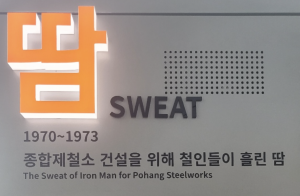Pohang: POSCO Museum
Photo essay of wall text of POSCO Museum of Pohang

Photo essay of wall text of POSCO Museum of Pohang

XXX

The article primarily discuss the motivations behind emergency response, and how that effects the actions taken by emergency response organizations. The authors claim that emergency response is motivated primarily by nationalism or self-preservation due to the global threat posed by epidemics and other health crisis. The idea of an emergency modality is presented, where rapid response to emerging issues is used as a preventative measure to avoid the spread of a crisis across national borders. The authors claim that emergency modality is the usual protocol for global health organizations due to the funds and resources available after an emergency due to public attention that are difficult to obtain for long term health problems.
Emergency response is not addressed in this article. This article could be of interest to medical responders, however, because it helps to give insight on our patient's suffering.
The apps do not translate the data into information, in most cases they simply receive and store data which can be forwarded to the police under certain circumstances.
Scott Gabriel Knowles is an expert in disaster and risk, he has written several papers and books on the cause of disasters and the risks found in the modern industrial era. He currently works as a professor at Drexel university and is a member of the Fukushima Forum collaborative research community.
This article was written by Miriam Ticktin, and Associate Professor of Anthropology and Co-Director of Zolberg Institute for Migration and Mobility at the New School. She received her PhD in Anthropology at Stanford University and the Ecole des Hautes Etudes en Sciences Sociales in Paris, France, and an MA in English Literature from Oxford as a Rhodes Scholar. Before coming to the New School, she was an Assistant Professor in Women’s Studies and Anthropology at the University of Michigan, and also held a postdoctoral position in the Society of Fellows at Columbia University. Her research primarily focusses on the intersections of the anthropology of medicine and science, law, and transnational and postcolonial feminist theory.
This policy protects EMS and firefighters, a group not often considered a vulnerable population but often has to go into situations in which they are vulnerable to attack on very little information. The ability to defend themselves, although the policy specifically states that this is not an effort to stop sending police to medical and fire calls, can reduce the risk of responding to calls in areas that are known to be dangerous.
The article focuses on the adapting regulations for ill immigrants to remain in France in order to receive treatment unavailable in their countries. Through the changes in protocol over nearly a decade the author shows how the system changed from case by case process in which many immigrants were denied a residence permit while suffering from serious illnesses, to an organized protocol that aimed to provide an equal opportunity to applicants regardless of location and department.